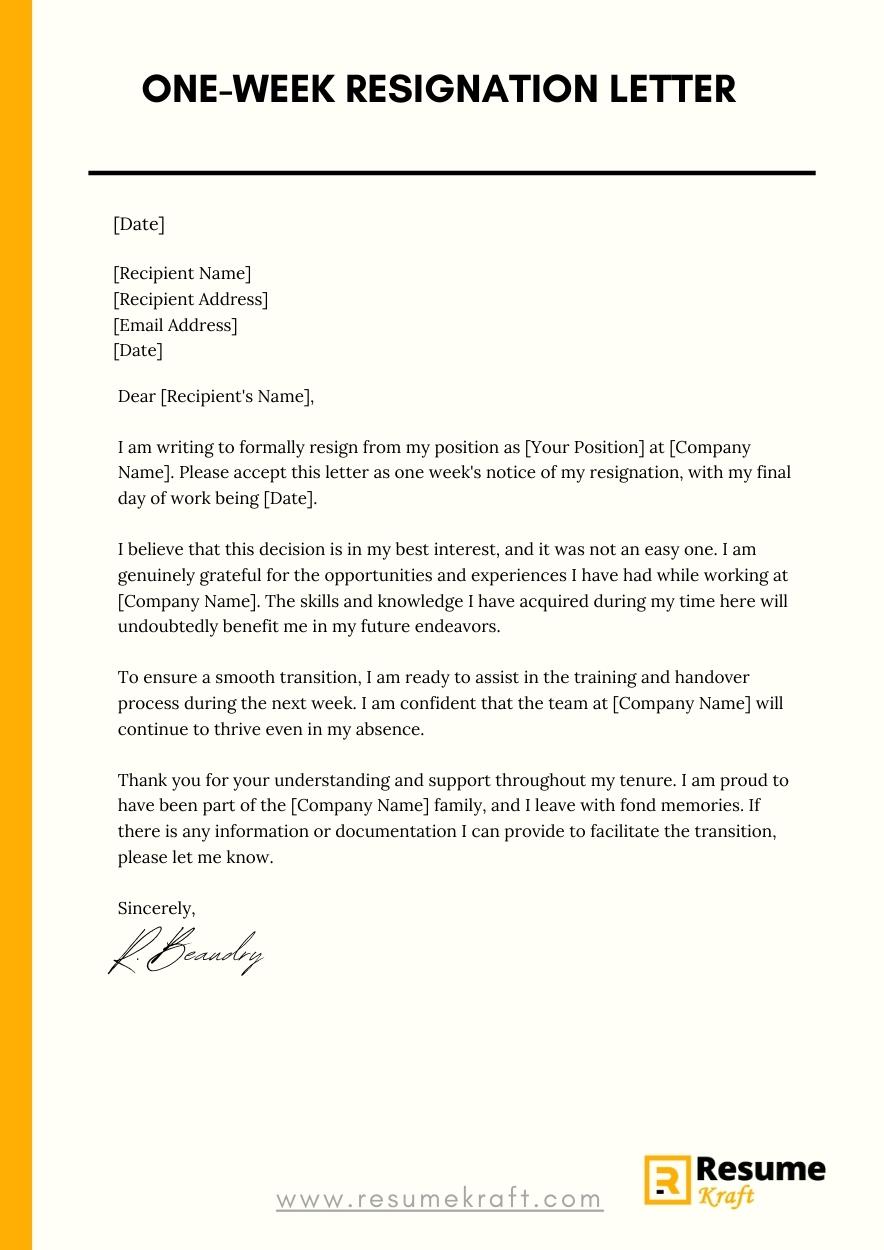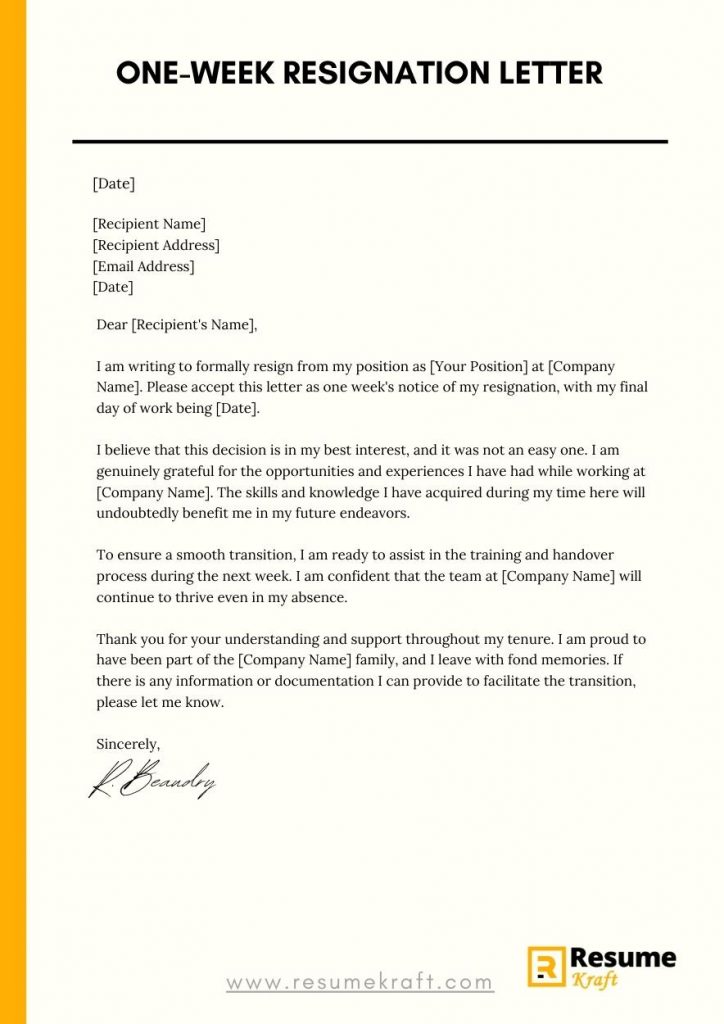
Are you considering resigning from your job on short notice? Maybe you’ve found a new opportunity that requires you to start within a week, or perhaps personal circumstances call for a swift exit. In situations like these, it’s essential to submit a resignation letter promptly. A resignation letter serves as a formal communication to your employer, ensuring a smooth exit and maintaining professional relationships. This article will guide you through the process of writing a one-week resignation letter, providing samples and tips to help you compose an effective message.
What To Include in a One-Week Resignation Letter
A one-week resignation letter should be concise and straightforward, clearly stating your intentions. Here are the essential elements to include in your letter:
- Header: Begin with your contact information, followed by the date and the employer’s details.
- Salutation: Address your recipient using their formal title or their full name if unsure.
- Opening Paragraph: Declare your resignation and specify the last day of work, explicitly stating that it will be one week from the date of the letter.
- Reason for Resignation: Optionally, you can mention the reason for your short notice resignation in a brief and professional manner.
- Gratitude: Express your appreciation for the opportunities and experiences gained during your time at the company.
- Transition Assistance: Offer assistance during your remaining time to aid in finding and training a replacement or tying up loose ends.
- Closing: End with a polite closing, such as “Sincerely” or “Best regards,” followed by your full name and signature.
What Not to Include in Your One-Week Resignation Letter
While it’s crucial to maintain professionalism, there are certain things you should avoid including in your one-week resignation letter. These include:
- Negative Remarks: Refrain from expressing negative opinions about the company, colleagues, or work environment.
- Detailed Reasons: Keep your reasons for leaving concise and positive, without going into excessive detail.
- Procrastination Excuses: Avoid blaming circumstances or situations beyond your control for your short notice resignation.
- Personal Attacks: Remain respectful and avoid personal criticism towards your supervisor or coworkers, even if there have been conflicts.
- Unprofessional Language: Use professional and polite language throughout your letter, avoiding slang, profanity, or informal expressions.
How To Format a One-Week Resignation Letter
Proper formatting is crucial in presenting a one-week resignation letter professionally. Here’s a suggested format to follow:
- Header: Include your name, address, phone number, and email address aligned to the left margin. Skip a line and add the date.
- Recipient’s Details: Beneath the date, align your employer’s name, job title, company name, and address to the left margin.
- Salutation: Address your recipient with their formal title and last name or the appropriate salutation.
- Body: Divide your letter into paragraphs, starting with an introductory paragraph and ending with a closing paragraph.
- Closing: Use a polite and professional closing phrase such as “Yours sincerely” or “Best regards,” followed by your full name and signature.
- Attachments: If applicable, mention any attached documents (e.g., a written notice of resignation or a formal acceptance of resignation).
One-Week Resignation Letter Samples
Below are samples of a printed resignation letter and an email resignation letter to guide you in crafting your own.

Printed Resignation Letter Sample
[Your Name]
[Your Address]
[City, State, ZIP]
[Phone Number]
[Email Address]
[Date]
[Recipient’s Name]
[Recipient’s Job Title]
[Company Name]
[Company Address]
Dear [Recipient’s Name],
I am writing to formally resign from my position as [Your Position] at [Company Name]. Please accept this letter as one week’s notice of my resignation, with my final day of work being [Date].
I believe that this decision is in my best interest, and it was not an easy one. I am genuinely grateful for the opportunities and experiences I have had while working at [Company Name]. The skills and knowledge I have acquired during my time here will undoubtedly benefit me in my future endeavors.
To ensure a smooth transition, I am ready to assist in the training and handover process during the next week. I am confident that the team at [Company Name] will continue to thrive even in my absence.
Thank you for your understanding and support throughout my tenure. I am proud to have been part of the [Company Name] family, and I leave with fond memories. If there is any information or documentation I can provide to facilitate the transition, please let me know.
Sincerely,
[Your Full Name]
[Your Signature]
Email Resignation Letter Example
Subject: Resignation – One Week Notice
Dear [Recipient’s Name],
I hope this email finds you well. I wanted to inform you that I have decided to resign from my position as [Your Position] at [Company Name], effective in one week’s time, specifically on [Date].
This decision was not easy, but circumstances require me to make this change. I would like to express my gratitude for the opportunities and valuable experiences I have gained during my tenure at [Company Name]. The knowledge and skills acquired here will certainly benefit me in my future endeavors.
I am committed to ensuring a seamless transition during the next week. Please let me know how I can best assist in the hiring or training of a replacement or any other tasks that require completion before I leave. I am confident that the team at [Company Name] will continue to thrive even without my presence.
Thank you for your understanding and support. It has been a pleasure working with you and the entire team at [Company Name]. If there are any documents or information I can provide to aid in the transition, please do not hesitate to contact me.
Best regards,
[Your Full Name]
Key Takeaways
- A one-week resignation letter should be concise and straightforward, clearly stating your intentions and the last day of work.
- Avoid negative remarks, excessive details, procrastination excuses, personal attacks, and unprofessional language in your letter.
- Proper formatting includes a header with your contact details, a salutation, body paragraphs, a polite closing, and any necessary attachments.
- Samples of printed and email resignation letters can provide guidance in composing your own letter.
Frequently Asked Questions
1. Why is it important to submit a resignation letter?
A resignation letter is a professional courtesy that notifies your employer of your intention to leave, allows for proper planning, and maintains a positive professional relationship.
2. What should I include in the reason for my one-week resignation?
When mentioning the reason in your letter, be brief and professional. You can state that unforeseen circumstances require you to leave on short notice or that you have received an excellent opportunity.
3. Is a printed resignation letter different from an email resignation letter?
The content and structure remain the same, but the format differs. A printed letter is typically more formal, while an email is suitable for a more casual or digital environment.
4. Can I hand in my resignation letter to my immediate supervisor instead of upper management?
Ideally, you should submit your resignation letter to your immediate supervisor and copy it to upper management or the HR department, if applicable.
5. Should I offer transition assistance in my one-week resignation letter?
It is considered professional to offer transition assistance in your resignation letter. This shows your commitment to ensuring a smooth departure and helps maintain a positive relationship with your employer.
Conclusion
Writing a resignation letter with just one week’s notice requires a focused and concise approach. By following the guidelines outlined in this article and utilizing the provided samples, you can compose a professional one-week resignation letter that maintains relationships and fosters a smooth transition. Remember, expressing gratitude and offering assistance can go a long way in leaving a positive lasting impression.

